Yes, There Is a Condiment King: A Field Guide to the Oddball Characters of 'The Lego Batman Movie'
When you’ve been caped-crusading in a burg as crime-ridden as Gotham for 75-plus years, you’re bound to face off with dozens of dastardly evildoers, and they all can’t be iconic. For every Joker, Catwoman, and Penguin, there’s a Kite-Man, Egghead, and King Tut.
Part parody, part paean, The Lego Batman Movie lovingly plumbs the depths of the Dark Knight’s rogues gallery to reward long-time Bat lovers — and perhaps confound casual fans. In the opening scene of the movie (watch it above), the Joker hijacks a plane over Gotham and spills the details of his latest nefarious scheme to take down his archenemy. The Clown Prince of Crime has recruited a who’s-who of fellow felons, among them such major big-screen miscreants as Riddler, Catwoman, Penguin, Bane, Two-Face, Scarecrow, Mr. Freeze, and Poison Ivy, as well as Suicide Squaddies like Harley Quinn, Killer Croc, and Captain Boomerang. The Joker has also enlisted a bunch of who’s-thats, a deep-nerd roster of long-forgotten and obscure foes from every era; among them: Calendar Man, Polka-Dot Man, The Eraser, Crazy Quilt, and the inimitable Condiment King.
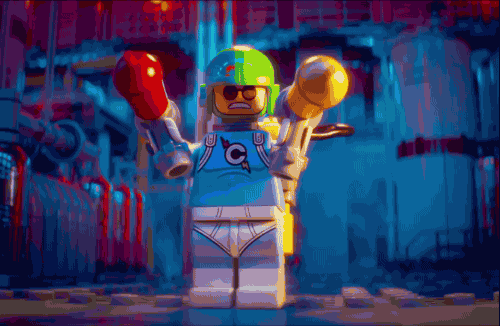
“OK, are you making some of those up?” asks the befuddled pilot.
“Nope, they’re all real,” retorts the Joker. “Probably worth a Google.”
We’ll save you the trip to a search engine. The filmmakers, led by director Chris McKay (an admitted comic-book nut who sports a Catwoman tattoo), know their Bat-lore. Here’s a quick rundown of all the B- (and, in some cases, Z-) listers who cameo in the movie, which opens Friday.

The Calculator: A disco-era Bat-foe, the Calculator arrived on the Gotham scene in 1976. WIth a costume inspired by then-popular pocket calculators, this guy was able to project light from his helmet and form it into weapons, à la Green Lantern.
Calendar Man: This villain likes to plot his crimes timed to certain special dates and holidays. Created in 1958, he is best known to contemporary audiences for his key role in the classic mid-1990s storyline Batman: The Long Halloween.
Catman: Originating in 1963, Catman was a lot like Batman in terms of skills, except using a feline motif. His costume is very similar to old-school Wolverine, down to the razor-sharp claws.
Clayface: A character who has existed in various forms since 1940. In his current incarnation (which inspires the movie character), Clayface has lost his human form and now exists as a giant amorphous creature who can mold his clay-like body into different shapes. Like Man-Bat, he is one of the better-known villains on this list, though not quite in the same realm as the Jokers, Penguins, or Harley Quinns.
Clock King: Originally an enemy of Green Arrow, Clock King arrived in the DC Universe in 1960 and is best known for his giant clock mask. His powers include the ability to see a few seconds into the future.
Condiment King: Created for Batman: The Animated Series in 1994, this pun-happy baddie was originally known as Mitchell Mayo and brandished guns that shot different condiments.
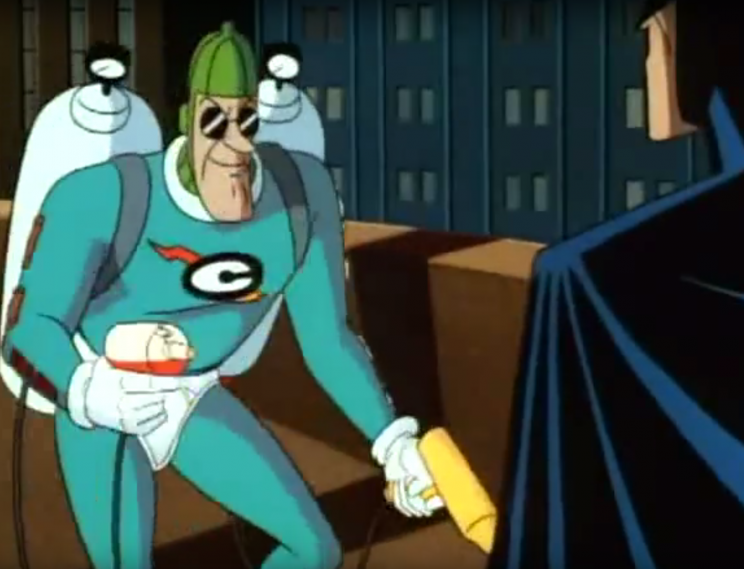
Crazy Quilt: Debuting in 1946 as an adversary to a team known as the Boy Commandos, Crazy Quilt eventually graduated to foe of Batman and Robin, using his Technicolor dreamcoat and hypnotizing helmet to commit crimes.
Egghead: Vincent Price originated this character for the 1966 Adam West-powered Batman TV series. Egghead took his name from his bald, oval-shaped head and his extreme intelligence; his trademark weapons were all egg-themed.
The Eraser: A former classmate of Bruce Wayne’s, this minor-league malefactor from 1966 created a pencil-like persona and hired himself out as someone who could erase all evidence from a crime scene thanks to his special helmet.
Gentleman Ghost: Also known as Gentleman Jim Craddock, he got his start battling Hawkman in 1947 before moving into the ranks of Batman rogues.
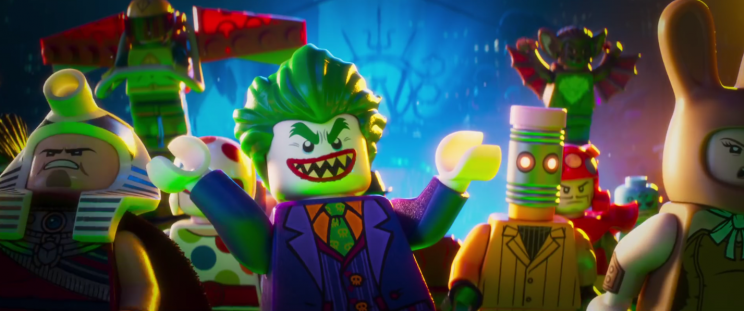
Kabuki Twins: These mysterious female twin martial artists, with acrobatic abilities and deadly claws, served as henchwomen for the Penguin in the 2004 animated series The Batman.
Killer Moth: Introduced in 1951, Killer Moth styled himself as the underworld’s answer to Batman, complete with Mothmobile, Moth-Signal, and Mothcave. Later versions of the character included wings in place of a cape — and at one point he was transformed by a demon into a giant insectoid creature befitting his name.
King Tut: A relic from the 1966 Batman series, Tut was a former Egyptologist who gets bonked on the head and believes himself to be the ancient pharaoh. He perpetrates crimes using creations based on ancient Egyptian lore.
Kite-Man: Debuting in 1960, this guy’s gimmick was to use kite-themed weapons to commit crimes. He was one of several lesser lights on this list to be revived for comic purposes in the 2008 cartoon series Batman: The Brave and the Bold.
Magpie: A character who first appeared in a 1986 issue of Man of Steel, in which Superman visits Bats in Gotham City, and the two heroes encounter this bewigged female foe, a museum curator who will do anything for shiny objects.
Man-Bat: One of the more recent additions to the rogues gallery, introduced in a 1970 comic book, Man-Bat is a former scientist who tests his bat-infused serum on himself only to transform into a monstrous creature. He was the first villain Batman faced in the classic Batman: The Animated Series.
March Harriet: Also known as March Hare, she surfaced in a 2008 story as part of the Wonderland Gang, which also included Mad Hatter, Tweedledum, and Tweedledee.
The Mime: Skilled in martial arts and miming, this 1987 emo villain lost her parents in a fireworks factory explosion and went bad.

The Mutant Leader: The guy with the torch on the far left of the movie poster above, Mutant Leader hails from Frank Miller’s 1986 genre-shaking classic Batman: The Dark Knight Returns; he runs the Mutant Gang and nearly kills Batman in battle.
Orca: This finned female antagonist debuted in 2000; she was a marine biologist who, after being paralyzed in an accident, attempts to heal herself using enhanced killer-whale DNA, only to turn into a Shamu-esque monster.
Polka-Dot Man: Or, as he likes to be called, “Mr. Polka-Dot Man,” is a 1962-launched weirdo who sports a costume covered in removable, weaponized dots to commit colorful crime. Like Kite-Man, Crazy Quilt, Clock King, and Hugo Strange, Polka-Dot Man was another forgettable villain resuscitated for The Brave and the Bold cartoon.
Red Hood: Created in 1951, Red Hood was initially the guise of Joker before he fell into a vat of chemicals while being chased by Batman and was transformed into the Clown Prince of Crime. The character was rebooted for the revered 1985 story line Batman: Under the Hood, as the deadly vigilante alter ego of Jason Todd, the ex-Robin long presumed dead.
Doctor Phosphorous: That glowing green skeletal figure in the back row of the movie poster is Doctor Phosphorous, a radioactive rogue who first battled Batman in 1977.
Professor Hugo Strange: This bearded evil scientist, who you can spot on the left side of the poster next to Mutant Leader, has been matching wits with Batman since 1940.
Tarantula: Originally a 1940s Golden Age male crime-fighter, the character was rebooted in 2002 as a female vigilante who uses deadly force — and has a controversial relationship with the grown-up Dick Grayson (a.k.a. Nightwing).
Zebra-Man: Initially, Zebra-Man was a one-off villain from a 1960 issue of Detective Comics with magnetic abilities and a striped costume. A second character with the same name and similar powers entered the DCU in 1987. He is another alum of The Brave and the Bold show.
Zodiac Master: This 1960s villain is best known for his astrological-themed costume and weaponry; his shtick is to predict catastrophes that he secretly contrives.
The Lego Batman Movie also delivers several deep-cut heroes from the DCU, many of whom pop up during an epic dance party at Superman’s Fortress of Solitude.
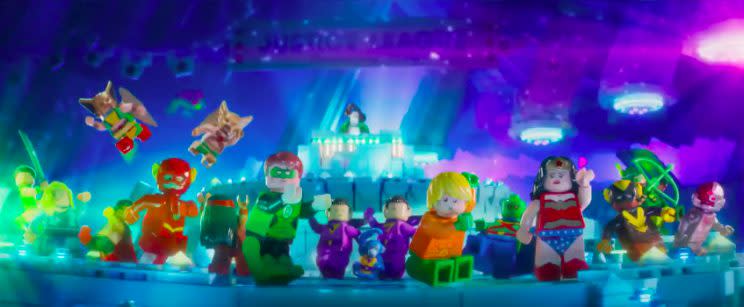
Aaron Cash: A security guard at Gotham’s Arkham Asylum, this character, introduced in 2003, had his left arm chomped off by Killer Croc and sports a hook prosthesis.
Apache Chief: One of several characters created specifically for the animated Challenge of the Super Friends in the late-1970s (see below) in a misguided attempt to bring diversity to the Justice League, this Native American hero could grow into a giant, talk to animals, and draw upon supernatural tracking skills.
Black Vulcan: Not to be confused with DC’s Black Lightning (who couldn’t be used due to pending litigation — but is finally about to get his own TV show), this African-American hero tapped the power of electricity. He was ultimately replaced by the better-known Cyborg.
El Dorado: Another straight-to-Super Friends hero, this Mexican marvel had an Aztec-inspired costume, could teleport, and peppered his dialogue with Spanish words.
Samurai: A Japanese member of the Super Friends team, Samurai had the ability to manipulate wind and create mini-tornadoes.
Wonder Twins: Debuting on Super Friends in 1977, Zan and Jayna were shape-shifting teen siblings from the planet Exxor who could transform themselves (Zan into forms of water; Jayna into any animal) by touching hands. Their pet space monkey, Gleek, is also in the movie.
Wonder Dog: The canine sidekick for the Super Friends’ original adolescent pair, the un-superpowered Wendy and Marvin, Wonder Dog serves as the DJ for Superman’s bash.
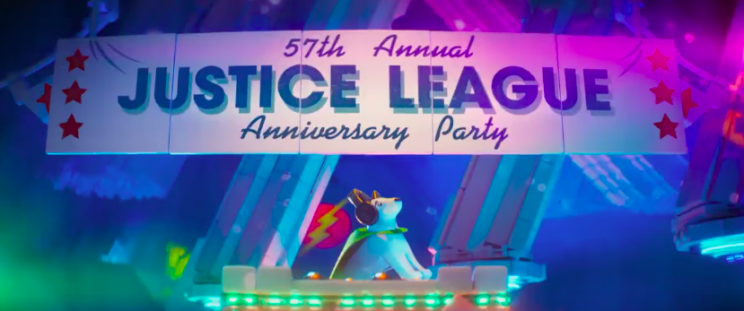
Related Stories:
(A hat-tip to The Lego Batman Movie: The Essential Guide for help sussing out some of the characters who make the briefest of appearances and The DC Encyclopedia for filling in the blanks.)

